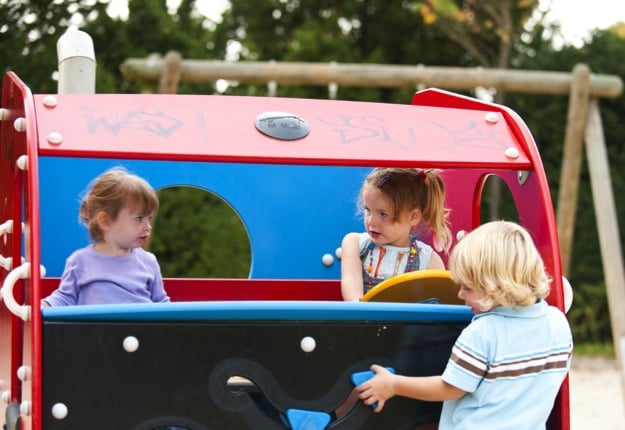Many parents are surprised to discover that when their child reaches the appropriate age to begin preschool, their sweet-natured and energetic tot can become bossy, mean or, on the opposite end of the spectrum, reclusive around his or her new peers.
While all humans have an inherent need to connect with one another, social skills needed to thrive and progress in an environment aren’t naturally acquired.
Your child’s first human encounters occur within the family, but it’s important that they are introduced to outsiders and other children early on to help them develop the necessary social skills and build up self-esteem that they will need in the future.
Playgrounds are vital at teaching social skills to children and they provide valuable lessons for both you and your little one that can help you both grow together as parent and child.
If you research “social skills activities kids” you will find many intriguing articles that suggest different games you can play with your child. They will often suggest enrolling them in a day care part-time prior to beginning a full-time preschool in order to help ease them into the new environment.
If you’re a stay-at-home parent or don’t feel that daycare is something you’re interested in, there are plenty of fun playgroups for kids that can be rewarding for you as well as fun and beneficial for your little one.
You may find that upon bringing your child to the park for the first time, they’re hesitant to leave your side and may become upset if you try to step back. Don’t force them to interact with other children right away.
Instead, ease them in by helping them explore all the fun and different playground equipment. Social skills can begin building right away as you take this opportunity to talk to them casually about manners (waiting for a turn, saying please and thank you) and sharing with others (“I think this little boy would like to play here too. Why don’t you two take turns?”).
Once your child begins to feel more confident, they’ll be willing to branch out on their own and begin playing with other children.
Make sure that you keep a constant eye on them and intervene when necessary. It’s inevitable that a bully will eventually shove them or make them cry, but make sure you don’t run over in flustered, screaming huff. Instead, approach the bully and his or her parent in a calm, peaceful manner but articulate your concern well.
Your child will learn from this experience. Make sure that you’re teaching them the best way to deal with conflict is to openly discuss it rather than lash out.
If you decide to enroll your child in a playgroup, take time to speak with the group leader and socialise with other parents. The instructor can provide you with helpful tips for continuing the social skill building outside of the group, and talking to other parents can offer support as well as present the opportunity to arrange separate play dates where both of your children can exercise their new skills and form new friendships.
By ensuring your child has exposure to social play, however you choose to achieve this, you are setting your child up for the best start you can when they go to school.
Do you have anything to share on helping children be socially ready for school?
Image courtesy of Shutterstock.com





















11:36 am
2:06 pm
3:11 pm
10:42 pm
5:48 pm
2:06 pm
7:02 am
6:16 pm
4:36 pm
3:23 pm
8:48 pm
4:46 pm
1:00 am
2:13 pm
6:48 pm
4:10 pm
2:11 pm
9:30 am
6:53 pm
1:07 pm
- 1
- 2
- »
Post a commentTo post a review/comment please join us or login so we can allocate your points.